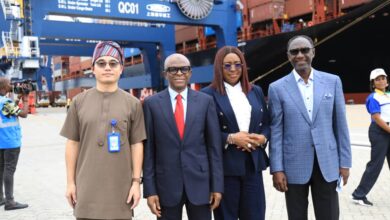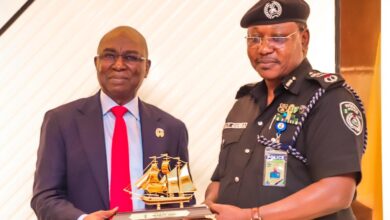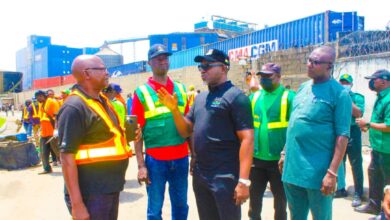
The Nigerian Shippers’ Council has reaffirmed the need for Nigeria to leverage on opportunities in the Marine and Blue economy.
The Executive Secretary of the Council, Barr. Pius Ukeyima Akutah, who was represented by the Principal Officer, Regulatory Services, Cadson Temitope emphasised the significance of the Marine and Blue economy, highlighting its vast potential to create jobs for Nigerians, leading to economic growth and development.
He disclosed this while delivering a goodwill message at the Maritime Finance Conference organised by the Association of Maritime Journalists of Nigeria (AMJON) in collaboration with the NLNG Shipping and Marine Service Limited at Sheraton Hotel, Ikeja, Lagos on Thursday.
Mr. Akutah in the conference’s themed “Vessel Acquisition/Construction: Nigerian Banks, Insurance Firms, Government & the Blue Economy” said: “The blue economy plays a crucial role in the economy of any country, as numerous studies have shown that 90% of international trade is conducted through the sea, which accounts for 70% of global trade revenue.
“Similarly, the blue economy, under the Ministry of Marine and Blue Economy (FMBE) is endowed with so much opportunities owing to the expanse of waters available to Nigeria, such as, numerous inland and archipelagic waters, territorial sea of 12 nautical miles, a contiguous zone of 24 nautical miles, an Exclusive Economic Zone up to 200 nautical miles. Therefore, Nigeria as a nation needs to harness the copious opportunities in the sector, some of which are the opportunities inherent in ship repairs/building, acquisition and financing.
“The Blue Economy has enormous capacity to create job opportunities for Nigerians, thereby ensuring socio-economic engagements and reduction of social problems induced by unemployment, through its multiplier effect on the progress of other economic activities.
“For instance, local shipyards help in developing indigenous capacity building in vessel construction and repairs, and attract business and revenue, e.g. building of ships and floating structures in LADOL, NIGERDOCK and other shipyards across the country; ship surveyors are required to survey the ships; Commercial banks’ interests in financing the acquisition/chartering and chartering of vessels; whilst insurance companies provide the necessary insurance covers.”
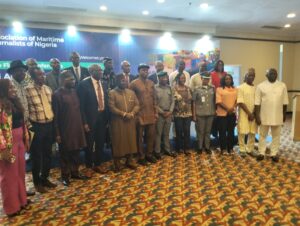
The Secretary commended the federal government on its determination to ensure global best practices in the blue economy by creating the Federal Ministry Marine & Blues Economy (FMM&BE) to generate and support the much-needed policy initiatives targeted at harnessing the blue economy.
Akutah stated that one of the statutory functions of Nigerian Shippers’ Council is to advise the Government of the Federation, through the Minister, on matters relating to the structure of freight rate, availability and adequacy of shipping space, frequency of sailings, terms of shipment, class and quality of vessels, port charges and facilities and other related matters.
“Therefore, we are indeed hopeful that today’s discussions will touch on some of these critical issues, and also speak to the issue of national carrier in order for Nigerian flagged vessels to be fully involved in the conveyance of Nigerian cargoes in the global maritime space to enable us sufficiently appreciate the benefits of the blue economy.
“Diverse efforts on the subject matter must take the form of a deliberate national policy to create a conducive business environment with the requisite incentive measures in order to attract the much-needed private sector investments.
“To fully actualise our objective, therefore, all critical players are encouraged to make adequate provision for research and development (R&D), and submit the findings of their R&D efforts to Regulatory bodies concerned.”
He urged the government through its regulatory agencies to build capacity and foster synergy through periodic engagements, develop public-private partnerships in R&D and encourage seamless exchange of information.
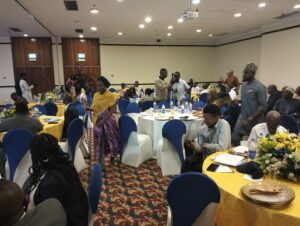
“Consequently, we at the Nigerian Shippers’ Council strongly call on all well-meaning industry players in the private and public sectors to collaboratively aid the birth of a national vision, that will drive vessel acquisition/construction in Nigeria, expand and implement the existing Shipping Sector Support Fund (Shipping fund/CVFF/NCDMB Maritime Fund).
“As the Economic Regulator for Ports in Nigeria, we are open to collaborating with technocrats, with a view to advancing the Council’s policy advocacy towards the overall development of the blue economy.”
He also commended AMJON for its initiative in organising the conference, which he hopes will address in great details the challenges of ship finance to vessel acquisition/construction, and also recommend the way forward.





